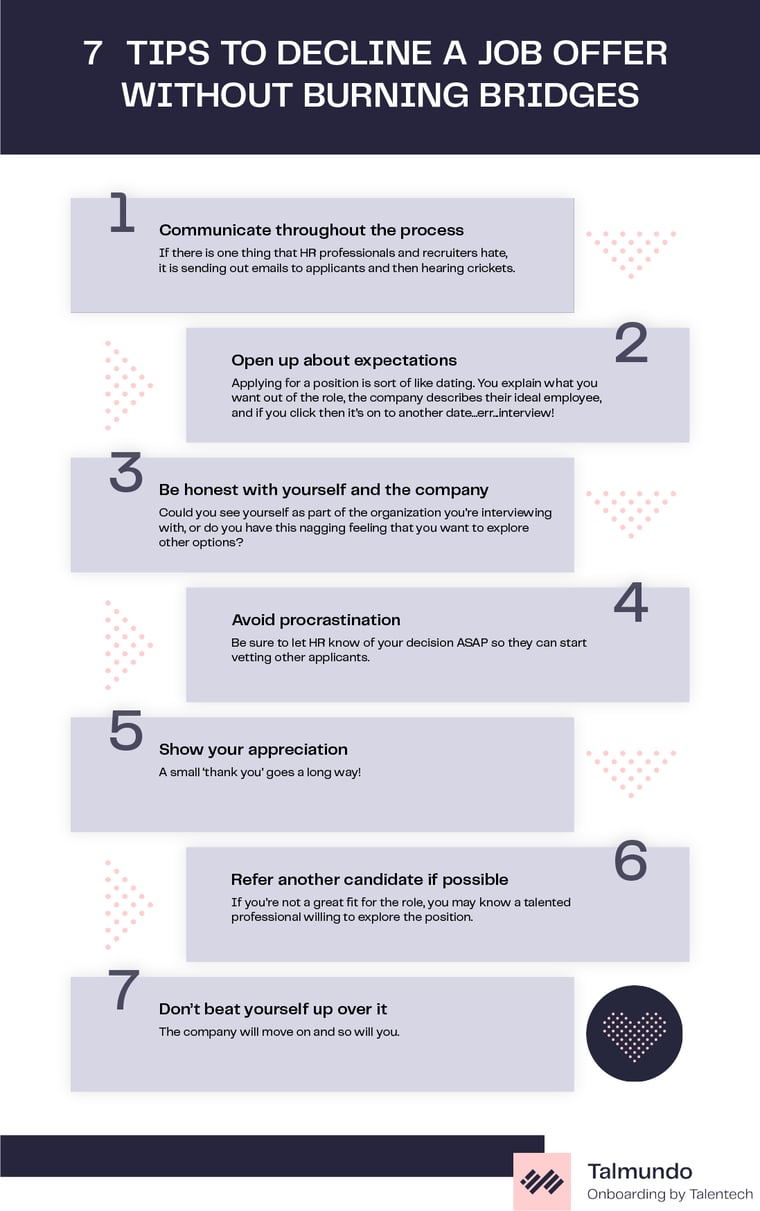There is nothing worse than a bad breakup. No, we’re not talking about the latest celebrity gossip, we’re referring to that moment when you have to break it off with a recruiter or hiring manager and decline a position you have been offered. Messy, right? Don’t worry. Despite what you may think, turning down an offer doesn’t have to mean bad blood. The 7 tips below can help you leave a good impression with HR throughout the interview process and avoid burning bridges if you don’t accept the position.
1. Communicate throughout the process
If there is one thing that HR professionals and recruiters hate, it is sending out emails to applicants and then hearing crickets. Avoid wasting their time (and yours!); email back quickly.
How quickly? 52% of people expect a reply to a work-related email within 12 to 24 hours, according to a survey conducted by MailTime.com.
2. Open up about expectations
Applying for a position is sort of like dating. You explain what you want out of the role, the company describes their ideal employee, and if you click then it’s on to another date… err, interview.
That is why it is so important to openly discuss your expectations during the interview process. You should be able to answer questions like:
- What is your ideal workplace culture?
- What are your salary expectations? Are you willing to negotiate on certain factors, such as accepting a lower salary in exchange for the ability to work remotely two days per week?
- Do the company’s values match your own?
Discuss these kinds of topics to see whether you are a good culture fit for the company and would be an engaged employee, and if you actually want the job.
3. Be honest with yourself and the company
Listen to that little voice in your head. Could you envision yourself as part of the organization you’re interviewing with, or do you have this nagging feeling that you want to explore other options?
It is not uncommon for people to persuade themselves to take job opportunities they don’t want because of the compensation or job security, or because they are afraid of leaving a bad impression by saying “no.”
Let’s be honest. If you have to convince yourself that a position is right for you and the company, it probably isn’t. Time to come clean to yourself and HR. They may not jump for joy, but they will appreciate your frankness if it means that they can pursue someone else who is 100% committed to their organization’s culture and success.
4. Avoid procrastination
Be sure to let HR know of your decision ASAP so they can start vetting other applicants. Don’t wait until they have let all the other promising candidates go and have to start the hiring process over again.
5. Show your appreciation
A small “thank you” goes a long way. When declining a position, digital recruiting company Monster suggests writing a sincere letter thanking HR for their time. Or, if you normally contact them by phone, give them a call to show your appreciation and end the relationship on a good note.
6. Refer another connection if possible
Even if you are not a great fit for the role, you may know a talented professional willing to explore the position—LinkedIn reports that 87% of passive and active candidates are open to new opportunities. Feel free to reach out to your network and pass along the names of anyone promising to HR.
7. Don’t beat yourself up about it
Turning down a job offer and “breaking up” with HR can be uncomfortable, but just remember that it is not the end of the world as long as you’re professional and considerate. The company will move on and so will you.
And here's a bonus infographic for all you visual people out there!




